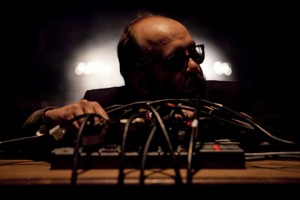How do you imagine your memory? As a rheumatic showgirl going through her old paces; a disembodied mouth yabbering its hoard; a frolicsome performance troupe or a whirring tape machine, speaking into the void?
Memory is the story the mind tells itself about itself, the unreliable biography that is all we’ve got. We build it up and then it starts to fall through our fingers. But how do you put it onstage? Pinter’s play Betrayal backtracks through disappointed desire, traces the unravelling of marriage and friendship. Sondheim’s Merrily We Roll Along moves along similar lines, while his Follies confronts retired chorines with phantoms of their bright-plumed, bright-eyed, shiny-hope young selves. But these aren’t so much memory dramas as plays about the past – its lost promise, its poor returns. How did we get to be here, as the disappointmonauts of Merrily sing?
But we don’t experience memory as neatly staged scenes or crafted movie flashbacks. It’s more of a mess. Treasure and detritus tumbled together – and both equally available for recall. There are false beginnings, unmoored endings, untethered images and sounds. Shards, fragments, loose threads flapping.
It has been a good year for memory on stage. Central to Pina Bauch’s 1980 – which I have written about here before and almost certainly will again – are ensemble scenes in which, in a daft and profound way, everything happens at once. A man with a tureen tucked beneath his arm, each pappy spoonful reminding him of lost family, wanders through people at quixotic play. Some are singing, others chase and squeal. Women in evening dress behave like toddlers. The grown ups fight or flirt or flail around. Some just sit on the grass and listen to a creaky old harmonium. The man skirts them, bemused, lifting the occasional spoon to his mouth.
Memory can feel like this. Messy, sad and mirthful all at once, setting the person you are loose among all the people you were and what they saw and what they made of it. Bausch achieves a lovely layering of unconnected sounds and images, vivid yet inconsequential – just the way memory reaches into the mind, at once junk shop and museum.
Beckett’s memory gabblers, sharply voiced and fleetingly embodied by Lisa Dwan (pictured top by Alastair Muir) in a recent programme, provide other images for the process. The sprinting mouth of Not I, lips working furiously in a tight spotlight, has no time to inflect, select or linger – it’s a galloping stream of recall. The old dame in Rockaby, tilting back and forth in her chair; the fretful pacer in Footfalls both suggest unbidden, unwelcome, inescapable memory.
And earlier this week I saw the solo performer Daniel Kitson tell tales about remembering in Analog.Ue at the National Theatre. He’s present throughout but doesn’t speak except on 46 endearingly archaic tape machines, reel to reels, clunky bedroom recorders. What better image for the retrieval of memory than a defunct technology, waiting to share its secrets if only we can be bothered to drag it from the loft and work out how to spark it up?
Kitson’s cantankerous melancholy frames a three-stranded story: about an old man spending a day recording his memories, the unhappy woman who listens to part of them 30 years later, and Kitson himself, an unhappy 36-year-old trying to create a new show, one of his displays of ‘oddly public solitude.’ The stories are often funny, but ultimately skew sad. Kitson spends the show spodding around with machines stacked at the back of the vast stage, bringing them forward and plugging them into a central spaghetti cluster of wires so that the relay can continue. His voiceover warns us that they could malfunction: increasingly, when he knelt to shine his torch at a recalcitrant machine, I’d feel slightly panicky about a breakdown that might stop the show.
It was just as well that the talk never halted for long, so that we weren’t left alone with our own sense of upset. We start off scrabbling to accrue memories and end up worrying as they slip into the dark. Kitson’s lonely people – he speaks like one of us – worry that all the photos and artefacts and knick-knacks they’ve accumulated aren’t enough. They can’t serve as a bulwark against time, because nothing can.
When Shakespeare describes ‘cormorant devouring time’, a heedless future gulping down the present, he means collective memory, not individual. But that idea of time gradually nibbling at our horde is piercing. If my memories go, what remains? What am I? Will I remember?
Follow David on Twitter: @mrdavidjays



[…] of deaccessioning (a bit theoretical) AJBlog: For What it’s Worth | Published 2014-03-12 Speak, memory AJBlog: Performance Monkey | Published 2014-03-12 Making it as a Writer: MFA vs NYC […]